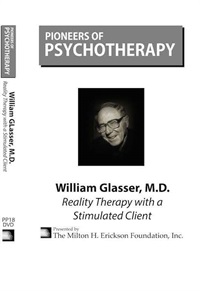William Glasser, MD - Reality Therapy with a Simulated Client, 12/15/1995, Video Stream More info »
William Glasser, MD - Reality Therapy with a Simulated Client
- Average Rating:
- Not yet rated
- Topic Areas:
- Clinical Demonstrations | Psychotherapy | Reality Therapy | Abuse
- Categories:
- Pioneers of Psychotherapy | Evolution of Psychotherapy | Evolution of Psychotherapy 1995
- Faculty:
- William Glasser, MD
- Course Levels:
- Master Degree or Higher in Health-Related Field
- Duration:
- 00:59:00
- Copyright:
-
Dec 15, 1995
- Publisher:
- The Milton H. Erickson Foundation Press
- License:
- Never Expires.
Description
Description:
William Glasser (1995) demonstrates with a simulated client who is in an emotionally abusive relationship. This client is depressed and unhappy with her life. The goal of the first session is to focus on a behavioral change that can be accomplished as a first step. Glasser concludes with an explanation of the demonstration and of control theory.
Educational Objectives:
- To demonstrate that Reality Therapy can be successfully applied to any type of client.
- To demonstrate that it can be applied to a couple.
From conference EP95-CD15-DVD
*Sessions may be edited for content and to preserve confidentiality*
Credits
Faculty

William Glasser, MD Related Seminars and Products
William Glasser, MD, who received his MD degress in 1953 from Case Western Reserve University was an American psychiatrist. William was awarded an honorary doctorate in human letters by the University of San Francisco. Founder and Director of the Institute for Reality Therapy, he was authoer and editor of ten books on the topics of reality therapy and education. He was also the developer of Choice Theory. His ideas, which focus on personal choice, personal responsibility and personal transformation, are considered controversial by mainstream psychiatrists, who focus instead on classifying psychiatric syndromes as "illnesses", and who often prescribe psychotropic medications to treat mental disorders.


